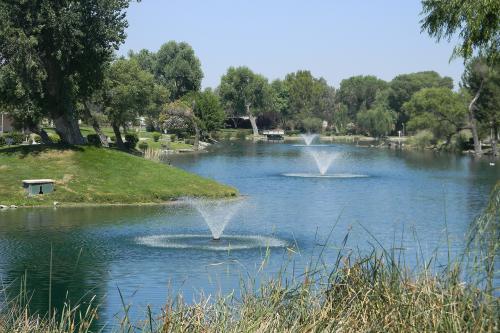Duckweed: What is it? How to Rid Your Pond of It.

Hunters and
wildlife enthusiasts may agree that both agree that ducks love Duckweed. Though
this is true, there don’t love it enough to keep it from spreading throughout
your pond.
Common
Duckweed of the genus Lemna, is a small plant that floats slightly below the
surface and on top of the water. When we see Common Duckweed, we typically see
other species with it, particularly Giant Duckweed and/ or Watermeal. Duckweed
can be one of the most invasive plants in your pond due their ability to
reproduce. These plants live in fresh, mostly still water, but will grow
anywhere fresh water is in the world, except in the coldest climates.
In
Venezuela, in 2004, Duckweed covered a notable portion of Maracaibo, the
country’s largest lake. The government sponsored a project for removal of the
plants with mechanical skimmers, removing over 75% of the plant mass.
Although
this sounds impressive, we need to understand that Duckweed can double itself
approximately every 48 hours in warmer temperatures.
If you ever
notice what appears to look like tiny leaves floating at the pond’s edge, pick them
up and get a closer look. Duckweed typically has two little green leaves that
are roughly half the size in diameter as a pencil eraser. Sometimes there is
only one leaf, and sometimes there is as many as three leaves, but two leaves
are more common. If you look closely, you will see tiny little white roots
extending from the joint of the leaves.
Some
aquarists like to use it for their aquarium fish. Certain areas of Southeast
Asia use duckweed for human consumption as a source of protein. Some aqua
culturists like to use it in their fish farms as a feed ingredient or to
extract nutrients from the water to clean it up. University researchers are
testing Duckweed as a potential source of renewable energy.
Recreational
pond management does not care for duckweed for the same reasons other people like
it – it will grow and spread fast. It can make its way to your pond by flowing
downstream, or it can go for a ride on the feathers of a passing water bird.
Your dog can bring it home with him after going for a swim in the neighbor’s
pond.
Once it
makes it to your water, it will reproduce either vegetatively or with its
seeds. One plant will split into two, two into four and so on. So, you have a duckweed
problem? What is a pond owner to do? How to get rid of duckweed? One way is to leave it alone, hope for a
flood to wash it downstream, or hope that a winter freeze with eradicate the
problem. Another is to physically remove by skimming the water or a pond fountain will help remove duckweed. The third is to
use the least toxic approved herbicide to eliminate it efficiently.
Rule out
using grass carp as a viable option. Though some individual grass carp may
figure out how to tip their mouth upward enough to eat it, duckweed grows far
beyond their abilities to control it. Forget out tilapia too. Tilapia will
nibble on watermeal, but they have not been proven to be effective on duckweed.
When
duckweed begins to rear its ugly head, a more realistic approach is to skim the
water’s surface with a swimming pool net. However, you must catch it early and
observe often with net in hand.
The third
option – the use of herbicides. But, here is where things get a little tricky.
Since duckweed floats on top and just below the water’s surface, you need to
carefully consider your treatment options. Consider hiring a professional for
advice or to perform the treatment for you. If you prefer to do the treatment
yourself, be sure to do your research.
Key points
to keeps in mind about duckweed. It floats, or at least some of it does, and it
travels around. Surface contact herbicides like glyphosate will take multiple
treatments.
Keep in mind
that duckweed reprocess prolifically, so even after eliminating some of it,
that does not mean that you have rid your water of it since it reproduces every
48 hours.
You may have
desirable species of submerged plants in your pond that you would like to keep.
Be certain that the herbicide you choose will impact the rest of your pond in a
way that you expect. In other words, prep yourself for collateral elimination.
If you
choose to use an herbicide, be sure to follow the labels directions and
understand the repercussions of decaying matter in your beloved fishing hole.
The last thing you want is oxygen depletion after the duckweed is gone.
Post Your Ad Here
Comments